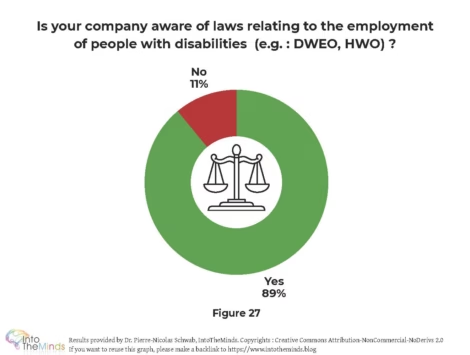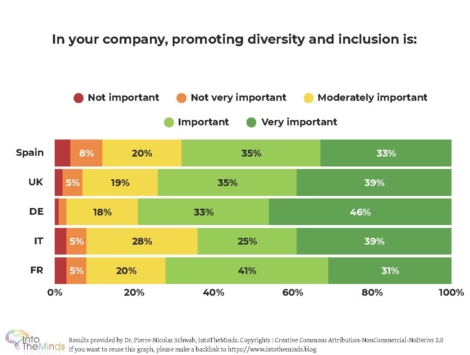Legal quotas, variable obligations, and growing awareness: the employment of disabled people in Europe illustrates the contrast between regulation and real business practices.
![Disability and inclusion: between obligations and reality in the workplace [Study]](https://5cc2b83c.delivery.rocketcdn.me/app/uploads/banner-blind-aveugle-jpg.webp)
As we saw in a previous study, diversity and inclusion initiatives are seen as levers for differentiation and competitiveness. In the extension of our other HR studies, we surveyed 1000 employers in 5 countries (France, UK, Spain, Italy, Germany) via an online survey on their perceptions and initiatives regarding diversity, disability, and inclusion. Some results seem surprising to us and appear to stem from a confirmation bias that we address in this article.
Contact IntoTheMinds for your HR studies
Key conclusions of the study
- 89% of surveyed companies claim to be informed about legal obligations regarding the employment of disabled people
- the percentage of companies claiming to know the legislation varies from 84% in France to 92% in Italy
- for 71% of European companies surveyed, promoting diversity and inclusion is a very important (37%) or important (34%) topic
- German companies are the most committed to diversity and inclusion, with 79% of them stating that diversity and inclusion are very important (46%) or important (33%)
Legal obligations for employing disabled people
Let’s start by recalling the legal framework: all the countries we analyzed prohibit discrimination based on disability. However, only France, Spain, Italy, and Germany impose a quantified quota. The UK does not impose quotas but reminds in the 2010 Equality Act that the employer has a duty to avoid substantial disadvantage to disabled people.
For the other countries, quotas vary:
- France: 6% of the workforce for employers with at least 20 employees (OETH)
- Spain: 2% of people with disabilities in companies with more than 50 employees
- Italy: quotas vary by company size. No quota for companies with fewer than 15 employees, and 7% for companies with more than 50 employees
- Germany: 5% quota for companies with more than 20 employees
This threshold of 50 employees in most countries also informs us about the number of companies affected by disability legislation: approximately 1% of European companies (0.8% have between 50 and 249 employees, and 0.2% more than 250 employees).
Knowledge of legal obligations regarding disability
The overwhelming majority of European companies thus have no legal obligation to employ disabled people. In this context, it seems surprising to us that 89% of HR managers in the companies we surveyed claim to be aware of these laws.
Of course, we cannot exclude that HR managers are trained in labor law regarding disability (we hope so at least). But the panel we surveyed reflected the sociodemographics of companies. In small companies, HR management is often handled by the manager/founder/director. We were therefore surprised by the level of knowledge in small structures, but this could be explained by the absence of legal constraints. In other words, it would be surprising that they are aware of these laws, especially if they are not affected.
Certainly, we could rejoice at this result, but it seems too optimistic to us. We therefore suspect that a bias may be at play:
- Either the respondents did not respond perfectly honestly for fear of being caught in fault.
- Or the absence of legal constraints led them to assert that they knew the legislation.
| Is your company aware of its obligations regarding the employment of people with disabilities? | Germany | France | Italy | Spain | Royaume-Uni |
|---|---|---|---|---|---|
| No | 12% | 16% | 8% | 12% | 10% |
| Yes | 88% | 84% | 92% | 88% | 90% |
Awareness of diversity and inclusion in the company
The majority of respondents (71%) consider, across all countries, that promoting diversity and inclusion in their company is important or very important. This corroborates our other HR studies, which have shown that diversity and inclusion are seen as factors of competitiveness. In particular, 32% of respondents in our turnover study had already implemented such actions to increase retention.
Only 8% of respondents believe that diversity and inclusion in the company are little or not important. We can therefore only rejoice at the evolution of mentalities. This finding confirms the trend anticipated by Hunt et al. (2018). These results confirm that D&I is perceived as a strategic challenge, due to its positive impact on employee engagement, brand reputation, and innovation.
The analysis by country shows no major differences between countries. Germany is, however, the country that gives it the most importance, with 46% of companies considering diversity and inclusion as “very important”, followed by Italy and the UK (39% each).
Spain (33%) and France (31%) show a slightly lower score.
But ultimately, as you can see in the graph, there seems to be broad consensus.
Conclusions and reflections
This study, which was a small part of our HR barometer, brings to light a reality that is not frequently addressed on diversity, disability, and inclusion in the company. This reality is that of a probable gap between acts and intentions on the one hand, and that of an obligation to fit into the general discourse on diversity and disability on the other.
If we stick to the statements of the HR managers surveyed, promoting diversity and inclusion is a priority in an overwhelming majority of companies. But this committed discourse contradicts, on the one hand, the employment rate of disabled people, for example, and on the other hand, the legal obligations in this area.
The majority of companies that responded to our survey belonged to a category (SMEs and small businesses) that is not subject to any obligation to employ disabled people. Declaring commitment to the inclusion of disabled people is therefore not binding and represents at best a marketing opportunity to attract employees sensitive to this theme. I am thinking here particularly of Generation Z (see our study on the subject).






![Illustration of our post "Recruitment by co-optation: state of the French market [survey]"](https://5cc2b83c.delivery.rocketcdn.me/app/uploads/shutterstock_2070689711-scaled-e1688048891453-120x90.webp)



